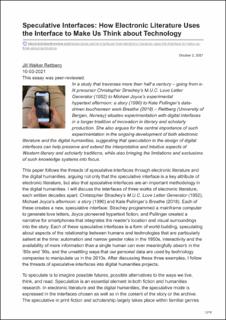Speculative Interfaces: How Electronic Literature Uses the Interface to Make Us Think about Technology
Journal article, Peer reviewed
Published version

Åpne
Permanent lenke
https://hdl.handle.net/11250/2988567Utgivelsesdato
2021Metadata
Vis full innførselSamlinger
Sammendrag
In a study that traverses more than half a century – going from e-lit precursor Christopher Strachey’s M.U.C. Love Letter Generator (1952) to Michael Joyce’s experimental hypertext afternoon: a story (1990) to Kate Pullinger’s data-driven touchscreen work Breathe (2018) – Rettberg situates experimentation with digital interfaces in a longer tradition of innovation in literary and scholarly production. She also argues for the central importance of such experimentation in the ongoing development of both electronic literature and the digital humanities, suggesting that speculation in the design of digital interfaces can help preserve and extend the interpretative and intuitive aspects of Western literary and scholarly traditions, while also bringing the limitations and exclusions of such knowledge systems into focus.
